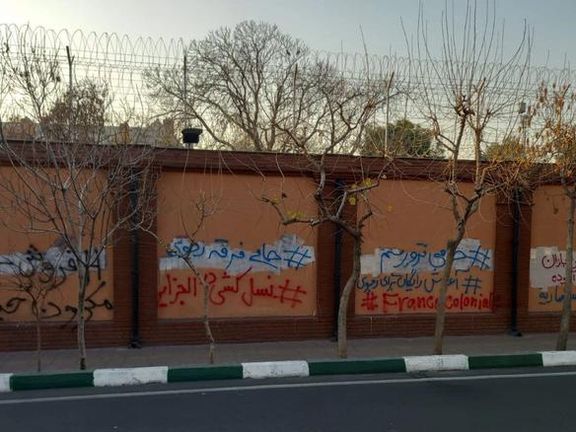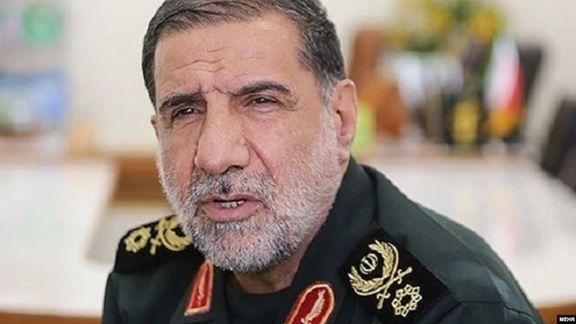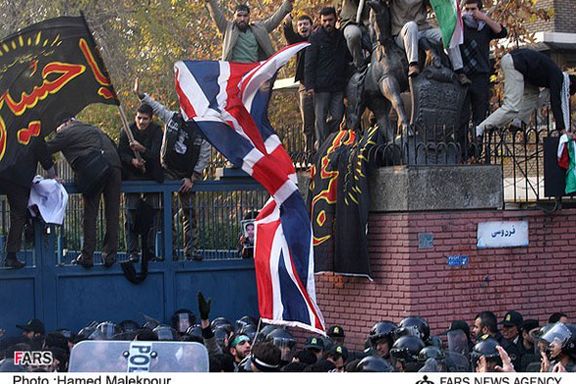Iran Hardliners Continue Campaign Against Britain, France

An Iranian lawmaker and IRGC officer in December called for the “serious implementation” of a 2011 law to reduce diplomatic relations with the United Kingdom.

An Iranian lawmaker and IRGC officer in December called for the “serious implementation” of a 2011 law to reduce diplomatic relations with the United Kingdom.
At the time the outer walls of the UK embassy in Tehran were defaced by anti-British slogans. This week, hardliner elements did the same to the French embassy after the satirical Paris magazine Charlie Hebdo published a special issue with caricatures of Supreme Leader Ali Khamenei.
The issue of downgrading Tehran's ties with London had also been discussed at the Iranian parliament in 2009 and 2010. In 2010 ultraconservative lawmakers demanded severing ties with London altogether. The motion was sent to the Foreign Relations and National Security Committee of the Majles, but did not go any further.
Esmail Kowsari, an IRGC general who is a member of the parliament (Majles), demanded the implementation of the law against the UK and also called on the government to reconsider its ties with Germany and France.
In 2011, the move was motivated by a set of UK sanctions against Iran and in late 2022 Iranian hardliners began a series of acts of vandalism against the British embassy in Tehran as the United Kingdom, Germany and France took the lead in escalating international actions against Iran's human rights violation and drone deliveries to Russia, as well as passing a resolution at the United Nations to set up a fact-finding committee about Tehran's violations of human rights.
Kowsari told Etemad Online in December that the three European states have sinister ideas about the Iranian nation and their anti-Iranian moves have proven this. Kowsari also said in an interview with the IRGC-linked Fars News Agency: "We wish to expand our diplomatic relations, but we do not want this relation at any price."

Thursday morning in Tehran, vigilante groups vandalized parts of the French embassy in Tehran in revenge for French satirical publication Charlie Hebdo publishing a special issue on Wednesday with cartoons about Khamenei under the title: "Let's take back the mullahs to where they come from."
The Iranian foreign minister called the cartoons "rude and unethical" and summoned the French ambassador to the Foreign Ministry to hand him a note of protest mindless of the fact that unlike the Islamic Republic, the French government does not intervene in the affairs of independent press. Foreign Minister Hossein Amir-Abdollahian threatened to give a firm and effective response to the satirical weekly. Meanwhile, Iran shut down the French "Iranian Studies Center" in Tehran, a prestigious research center whose works are respected by Iranian and French scholars.

The 2011 legislation was followed by an arson attack on the British embassy in Tehran by vigilante groups who were characterized by the government-owned press as "students," but independent sources questioned the characterization. Iran's -then- deputy foreign ministers Hassan Ghashghavi and Ali Ahani went to the Majles to convince the lawmakers that cutting ties with London was not in the country's interest. The Majles subsequently added a clause to the legislation which said that ties with the UK could be normalized if the UK changed its policies toward Iran.
In 2017 Ahmadinejad called the legislation and the attack on the British embassy a move that provided pretexts to the United Kingdom to take action against Iran. He also accused the Iranian state television of broadcasting live the attack on the British embassy.
Hardliner members of the parliament prevented -then- UK Foreign Secretary Jack Straw from taking part in Hassan Rouhani's inauguration ceremony in 2013. But eventually, three years later the two countries’ embassies were reopened after a relatively long closure.